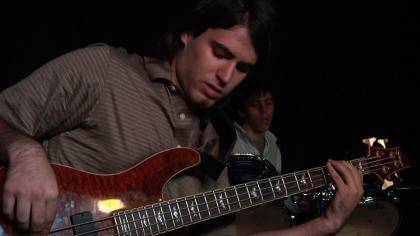
When Hollywood filmmaker Tom Ropelewski’s son was young, his teachers had a hard time keeping him in the classroom.
“My son drove his teachers crazy,” Ropelewski said. “He would walk out of class every once in a while and tell the teacher that he would come back once the teacher started covering material he didn’t already know.”
Ropelewski’s son, now a high school student, is considered twice-exceptional, possessing both enormous intellectual gifts (he was able to read at 13 months) while grappling with learning challenges. Many twice-exceptional children fall on the autism spectrum or are diagnosed with ADHD. Inspired by his son’s classmates at Bridges, a private school in Los Angeles catering to twice-exceptional children, Ropelewski wrote and directed a documentary following several 12th graders at the school.
Ropelewski will screen his documentary, “2e: Twice Exceptional,” on March 6 in White Lecture Hall on East Campus, just more than a week after its world premiere at the Richmond International Film Festival -- where it was awarded "Best Documentary Feature". A panel discussion featuring Ropelewski and twice-exceptionalities experts Mary Ruth Coleman and Shelagh Gallagher will follow the screening. The free, public event is co-sponsored by the Duke Program in Education and Durham Public Schools.
Kristen Stephens will moderate the discussion and is also the director of the Academically/Intellectually Gifted Licensure Program within the Duke Program in Education. Stephens said twice-exceptional education is still an unexplored realm for most schools.
“Due to the nature and manifestation of their exceptionalities, these students are at-risk for being overlooked in our classrooms,” Stephens said. “Either their high intelligence or advanced academic abilities compensate for their weaknesses in a manner that makes them appear as ‘average’ students, or only one of their exceptionalities is recognized.”
Both Stephens and Ropelewski hope “2e” will raise educators’ awareness of these students’ needs and encourage them to cater their gifted curricula to help students achieve their potentials rather than emphasizing their learning disabilities.
“I hope a deeper understanding of the lived experiences of [twice-exceptional] students will encourage educators, parents and others to advocate for these students in their schools and community,” Stephens said. “In addition, I hope the screening will provide a forum where successful practices can be shared and discussed.”
Ropelewski added: “My hope is that this film will start a national dialogue about twice-exceptional education. At the moment, it is difficult to educate these kids at traditional schools because the path they want to take through life is off the grid—it’s a path that most of us can never understand.
“Some of these students may be the next Bill Gates or Mozart, but we’ll never know until we start teaching to their gifts and helping them overcome their challenges.”
For more information on the screening and panel discussion on March 6, click here. For more information about the film, click here. To view the film’s trailer, click here.